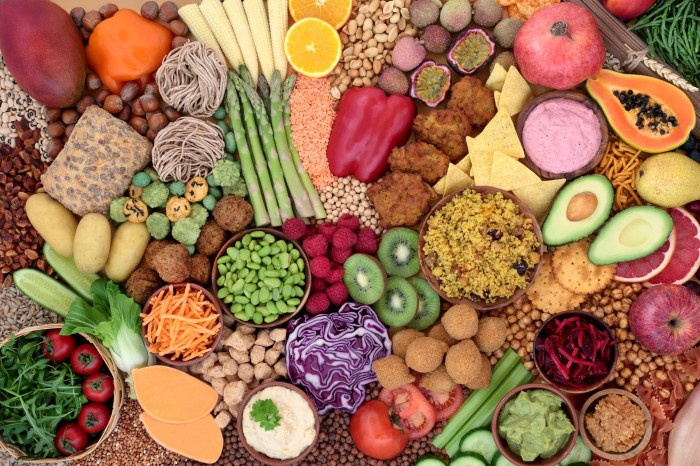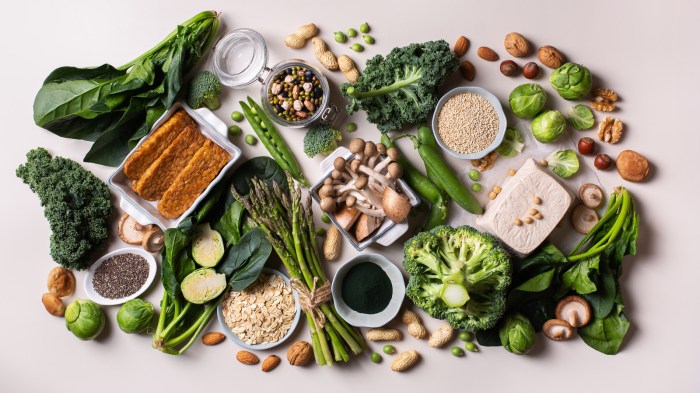What is a good vegetarian diet – Embarking on a vegetarian diet can be a transformative journey towards improved health and ethical living. In this comprehensive guide, we delve into the intricacies of what constitutes a good vegetarian diet, exploring its potential benefits, essential nutrients, and practical tips for planning a balanced and nutritious meal plan.
Whether you’re a seasoned vegetarian or considering adopting a plant-based lifestyle, this exploration will provide valuable insights and empower you to make informed choices about your dietary needs.
Introduction to Vegetarian Diets

Vegetarian diets are those that exclude meat, poultry, fish, and seafood. There are various types of vegetarian diets, each with varying levels of restrictiveness.
Embark on a journey to mindful eating with a vegan diet. How to Eat a Healthy Vegan Diet provides a comprehensive guide to fuel your body with plant-based goodness. Discover the secrets to a balanced and nutritious lifestyle that promotes well-being and vitality.
Some of the potential benefits of adopting a vegetarian diet include improved heart health, reduced risk of certain types of cancer, and weight management. Vegetarian diets are also generally more environmentally sustainable than meat-based diets.
Types of Vegetarian Diets
- Lacto-ovo vegetarianseat dairy products and eggs in addition to plant-based foods.
- Lacto vegetarianseat dairy products but not eggs.
- Ovo vegetarianseat eggs but not dairy products.
- Veganseat only plant-based foods and avoid all animal products, including dairy, eggs, and honey.
Essential Nutrients in Vegetarian Diets
Maintaining a well-rounded vegetarian diet necessitates ensuring the consumption of essential nutrients. This includes obtaining adequate protein, iron, calcium, vitamin B12, and omega-3 fatty acids from plant-based sources.
Embarking on a vegan lifestyle can be a transformative experience, but it’s crucial to ensure you’re nourishing your body with the right nutrients. To achieve a healthy vegan diet, consider incorporating a wide range of plant-based foods, including fruits, vegetables, whole grains, and legumes.
For a comprehensive guide on how to navigate this dietary shift, refer to how to eat a healthy vegan diet.
Vegetarian diets, when planned thoughtfully, can provide all the necessary nutrients for optimal health and well-being. Let’s delve into each nutrient and explore rich plant-based sources to meet these dietary requirements.
Protein
- Legumes(beans, lentils, chickpeas): Rich in protein, fiber, and iron.
- Tofu and tempeh: Excellent sources of complete protein, containing all essential amino acids.
- Nuts and seeds(almonds, walnuts, chia seeds): Provide protein, healthy fats, and fiber.
Iron
- Leafy green vegetables(spinach, kale): Abundant in iron, but it’s non-heme iron, which is less absorbable than heme iron found in animal products.
- Legumes: Good sources of iron, especially when paired with vitamin C-rich foods to enhance absorption.
- Fortified cereals and breads: Enriched with iron, providing a convenient way to meet daily requirements.
Calcium
- Fortified plant-based milk(soy milk, almond milk): Excellent sources of calcium, often comparable to cow’s milk.
- Leafy green vegetables: Rich in calcium, but like iron, it’s less absorbable than calcium from dairy products.
- Tofu: Contains calcium, especially when fortified with calcium sulfate.
Vitamin B12
Vitamin B12 is primarily found in animal products, so vegetarians need to pay special attention to its intake.
- Fortified plant-based milk and cereals: Enriched with vitamin B12, providing a reliable source for vegetarians.
- Nutritional yeast: A deactivated yeast that is a rich source of vitamin B12.
Omega-3 Fatty Acids
Omega-3 fatty acids are essential for heart and brain health. While primarily found in fatty fish, vegetarians can obtain them from plant-based sources.
- Flaxseeds and chia seeds: Rich in alpha-linolenic acid (ALA), a plant-based omega-3 fatty acid that the body can convert to EPA and DHA.
- Algae oil supplements: Provide EPA and DHA directly, offering a concentrated source of omega-3s for vegetarians.
Planning a Healthy Vegetarian Diet

Crafting a balanced vegetarian meal plan is essential for optimal health and well-being. By incorporating a variety of plant-based foods, vegetarians can meet their daily nutrient requirements and enjoy a satisfying and nutritious diet.
Meal variety is crucial to ensure a comprehensive intake of essential nutrients. Aim to include fruits, vegetables, whole grains, legumes, nuts, and seeds in your daily meals. Each food group offers a unique set of nutrients, ensuring a well-rounded dietary intake.
Portion Control
Mindful portion control is key to maintaining a healthy weight and preventing overconsumption. Use measuring cups and spoons to ensure appropriate serving sizes and avoid overeating. Pay attention to food cues, such as fullness and satisfaction, to avoid overindulging.
Meeting Nutrient Requirements
Vegetarian diets can provide all the essential nutrients needed for good health. However, it is important to be aware of potential nutrient deficiencies and take steps to address them. Good sources of iron include fortified cereals, legumes, and leafy green vegetables.
Vitamin B12 is primarily found in animal products, so vegetarians should consider fortified foods or supplements to ensure adequate intake.
Calcium is another nutrient that vegetarians may need to pay attention to. Good sources include fortified plant-based milks, leafy green vegetables, and tofu. Protein is also essential, and vegetarians can meet their needs through a variety of plant-based sources, such as legumes, tofu, tempeh, and nuts.
Sample Vegetarian Meal Plan
A well-planned vegetarian diet provides all the essential nutrients the body needs. Here’s a sample meal plan that demonstrates how to incorporate a variety of food groups and nutrients into a vegetarian diet:
Breakfast
- Oatmeal with berries, nuts, and seeds (provides complex carbs, fiber, protein, healthy fats, and antioxidants)
- Tofu scramble with vegetables (provides protein, iron, and vitamins)
- Whole-wheat toast with avocado and hummus (provides complex carbs, healthy fats, and protein)
Lunch
- Lentil soup with whole-wheat bread (provides protein, fiber, and vitamins)
- Quinoa salad with roasted vegetables, beans, and nuts (provides complex carbs, protein, healthy fats, and fiber)
- Vegetarian chili with cornbread (provides protein, fiber, and vitamins)
Dinner, What is a good vegetarian diet
- Grilled tofu with roasted vegetables and brown rice (provides protein, fiber, and vitamins)
- Vegetarian shepherd’s pie with lentils and mashed potatoes (provides protein, fiber, and vitamins)
- Pasta with marinara sauce, vegetables, and beans (provides complex carbs, protein, and fiber)
Snacks
- Fruits (bananas, apples, berries) (provide vitamins, minerals, and fiber)
- Vegetables (carrots, celery, cucumbers) (provide vitamins, minerals, and fiber)
- Nuts and seeds (provide healthy fats, protein, and fiber)
- Yogurt (provides protein, calcium, and probiotics)
This meal plan provides a variety of nutrients, including protein, carbohydrates, fiber, vitamins, and minerals. It also includes a variety of food groups, such as fruits, vegetables, whole grains, legumes, and nuts. By following a well-planned vegetarian diet, you can meet all of your nutritional needs.
Challenges and Benefits of Vegetarianism

Adopting a vegetarian diet can present certain challenges, but it also offers numerous benefits. Understanding both sides of the equation can help individuals make informed decisions about their dietary choices.
Challenges of Vegetarianism
Some potential challenges associated with vegetarianism include:
- Social stigma:Vegetarians may face social pressure or disapproval from individuals who do not understand or support their dietary choices.
- Nutrient deficiencies:Vegetarian diets can be low in certain nutrients, such as iron, vitamin B12, and calcium. Careful planning is necessary to ensure adequate intake of these essential nutrients.
Benefits of Vegetarianism
Despite these challenges, vegetarianism offers several significant benefits, including:
- Improved health:Vegetarian diets are often rich in fruits, vegetables, and whole grains, which are associated with a reduced risk of chronic diseases such as heart disease, stroke, and type 2 diabetes.
- Environmental sustainability:Meat production has a significant environmental impact, contributing to greenhouse gas emissions, deforestation, and water pollution. Vegetarian diets can help reduce this impact.
- Ethical considerations:Many vegetarians choose this dietary approach based on ethical concerns about the treatment of animals in the food industry.
Final Summary: What Is A Good Vegetarian Diet
In conclusion, a well-planned vegetarian diet offers a plethora of health benefits, ethical considerations, and environmental advantages. By embracing a diverse range of plant-based foods, vegetarians can thrive and enjoy a fulfilling and nutritious lifestyle.
Question & Answer Hub
Is a vegetarian diet nutritionally adequate?
Yes, a well-planned vegetarian diet can provide all the essential nutrients required for optimal health.
What are the main challenges of following a vegetarian diet?
Potential challenges include ensuring adequate protein, iron, calcium, and vitamin B12 intake, as well as navigating social situations where vegetarian options may be limited.
Is a vegetarian diet better for the environment?
Yes, vegetarian diets generally have a lower environmental impact compared to meat-based diets, as they require less land, water, and energy to produce.